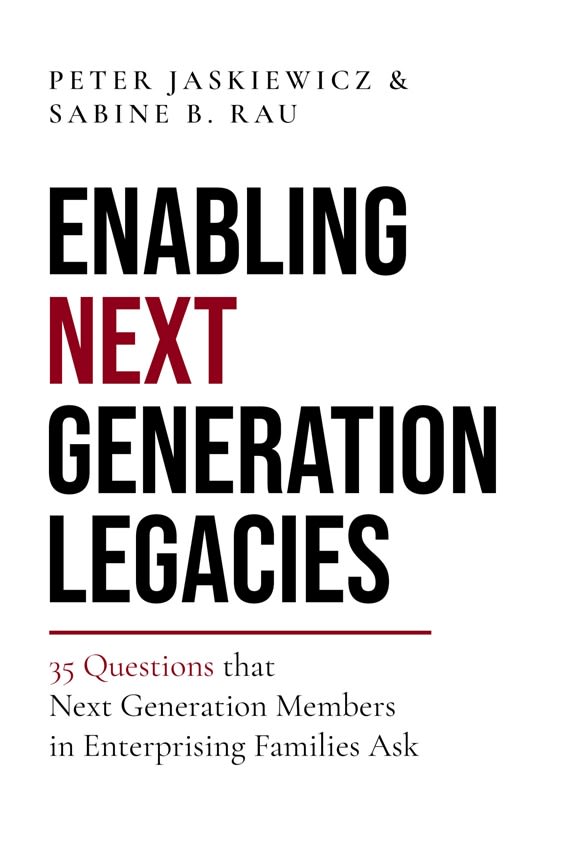Gaining Credibility with Nonfamily Execs and Board Members – Excerpt from Enabling Next Generation Legacies

The Family Enterprise Legacy Institute has been featuring select parts from the book, Enabling Next Generation Legacies: 35 Questions That Next Generation Members in Enterprising Families Ask. The result of years of international research and practical experience, Enabling Next Generation Legacies delves into the unique challenges that confront family enterprises. Telfer professors Peter Jaskiewicz and Sabine Rau have brought together the world’s leading academics, practitioners, and enterprising families to answer the most pressing questions faced by Next Generation members in a short and concise, yet meaningful way.
The book consists of best practices, real-life examples, and additional critical questions for reflection from nearly 100 contributors from 27 different countries. Expert commentaries come from members of the world’s leading family businesses including Auchan (France), Saputo (Canada), and Sabra (Israel), as well as from various academic experts from business schools around the globe like Kellogg, IMD, and INSEAD.
Below, read an expert response to a pressing question raised by Next Generation members.
How Can I Gain Credibility with Nonfamily Executives and Board Members?
Response by Nadine Kammerlander, Germany
In the twenty-first century, many Next Gens aim to take an active rather than passive ownership role early on. For instance, they strive for board positions, where they can challenge current strategies and provide novel and fresh perspectives (e.g., on digital transformation). However, many Next Gens wonder whether the fellow Next Gen has been appointed because of their capability or because of family membership. This is a relevant concern since such appointments counter the usual age structure of many boards. A WHU study found that there were hardly any members on the boards of German family firms below the age of forty and less than 20 percent were between forty and fifty.
When aiming to take over ownership responsibility, Next Gens need to be self-confident and have the family members support their decision to join the board. But it is also the firms’ stakeholders, amongst others, nonfamily executives and further board members, who need to be convinced about the Next Gen’s qualification to advise and control the family firm. There might be some skepticism since in the past it was often a given that one or few of the children took over firm control, irrespective of qualification. Many anecdotes show that incompetent owners might hire the wrong managers and take the wrong overarching strategic decision. Such competences include a general understanding of the family firm and its industry, the global and technology-related changes affecting the industry, and also the ability to engage in strategic discussions, read financial statements, and assess the performance of top managers. Next Gens need to prove their knowledge, experience, and general judgment abilities. If they lack full acceptance by other stakeholders, they might have trouble being heard or listened to in board meetings. So, what can Next Gens do to gain credibility with executives and other board members?
Interaction with Family Members Before Ownership Succession
The time before succession forms the basis for all later steps. As such, it is important that Next Gens push for an objective successor selection process that scrutinizes the ability, motivation, and skills of potential Next Gen owners in a systematic way. This can provide them with convincing arguments that they were not chosen for board roles because of blood ties but because of their talent. In this regard, recent research from Switzerland has shown that it is beneficial if the successor assessment and decision is carried out by a diverse team that also includes nonfamily board members.
Interaction with Nonfamily Stakeholders Before Ownership Succession
Next Gens should also think about their interactions with nonfamily stakeholders early on. Indeed, interaction with nonfamily stakeholders before taking on an active ownership role is a key success factor. Successful Next Gens report that they have been present in the firm and know key stakeholders from an early age. While this might go along with the drawback of being seen as “the CEO’s kid,” it also builds up trust in the Next Gen’s intentions. A successor reported that after her decision to become an active owner, the external stakeholders felt relieved as they knew the firm would be continued as a family firm and be in good hands. In addition to trust, the Next Gens also need to think about what relevant knowledge they should build up before succession in order to gain credibility. This could be achieved by founding their own firm or getting a proper business-related education at a top university.
Interaction with Family Members after Ownership Succession
Once ownership succession has officially taken place, the roles of the various family members change. Often, the senior generation is still—formally or informally—present in the overall firm decision-making, even if the Next Gens have already taken over an active ownership role. Now it is important to set rules for interaction to maintain a professional relationship amongst generations and to manifest the solidity of the Next Gen’s power. For instance, it is important to keep family conflicts out of any board meetings and to send clear signals that the senior generation backs the decisions of the Next Gen.
Interaction with Nonfamily Stakeholders after Ownership Succession
Young and female Next Gens especially complain about a lack of respect from long-tenured (nonfamily) managers. So, what can they do to quickly gain credibility? Many successful Next Gens highlight the necessity to immediately show high levels of competence. This can be achieved, for instance, by shaping the firm’s strategy (e.g., regarding digitalization) and asking the right questions. Other measures include building up the right team of top managers. A Next Gen from an HR company reported that making sure to work with the right people—and replacing some of her father’s intimates—was a key success factor for role in the family business.
Practical Implications
The need to convince family-internal as well as family-external stakeholders about one’s own competences bears important implications for Next Gens. First, they need to show “presence” in the firm (e.g., at firm events) from early on in order to prove their commitment to the firm. Second, Next Gens should dedicate time and effort to gain business-related knowledge and experience, for instance, through business school education and gaining their own managerial or entrepreneurial experience. Third, Next Gens should make sure that there’s a systematic and neutral process in place that assesses their suitability as active board members. Lastly, they need to make sure to contribute sufficiently and constructively once they have assumed their active ownership position—for instance, by stimulating change regarding digital business models.
Conclusion
In sum, the examples show that gaining credibility is not a one-time effort but a continuous process. Indeed, some Next Gens reported that it took from a few months up to five years until they had gained full credibility. The right strategies in place, as well as support by family members and nonfamily mentors, might speed up the process.
Nadine Kammerlander is a professor of family business at WHU—Otto Beisheim School of Management in Germany, where she also leads the Institute of Family Business and Mittelstand. She earned her PhD at the University of Bamberg (Germany) and worked several years as a strategy consultant. Her research, teaching, and consulting centers around topics of family firm and family office entrepreneurship, leadership, and governance. Her research has been published in leading international journals and was honored with multiple national and international awards. Prof. Kammerlander is also a board member in the Association of German Supervisory Board Members (VARD e.V.)
Enabling Next Generation Legacies: 35 Questions That Next Generation Members in Enterprising Families Ask is now available in eBook and hardcopy. All royalties from Enabling Next Generation Legacies go towards the University of Ottawa’s Telfer Fund, helping students in need.
To read more about how Telfer is shaping the conversation about the future of family enterprise, visit the Family Enterprise Legacy Institute and subscribe to our newsletter to stay up to date.
